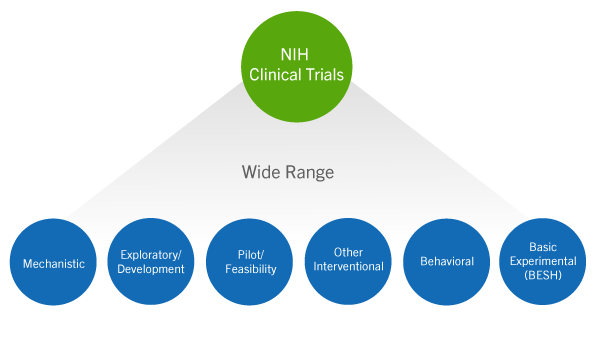This page provides information, tools, and resources about the definition of a clinical trial. Correctly identifying whether a study is considered by NIH to be a clinical trial is crucial to how you will:
- Select the right NIH funding opportunity for your research study
- Write the research strategy and human subjects sections of your grant application and contract proposal
- Comply with appropriate policies and regulations, including registration and reporting in ClinicalTrials.gov
Background
In 2016, NIH launched a multi-faceted effort to enhance its stewardship over clinical trials. The goal of this effort is to encourage advances in the design, conduct, and oversight of clinical trials while elevating the entire biomedical research enterprise to a new level of transparency and accountability. The NIH definition of a clinical trial was revised in 2014 in anticipation of these stewardship reforms to ensure a clear and responsive definition of a clinical trial. Learn more about why NIH has made changes to improve Clinical Trial Stewardship.
NIH Definition of a Clinical Trial
A research study in which one or more human subjects are prospectively assigned to one or more interventions (which may include placebo or other control) to evaluate the effects of those interventions on health-related biomedical or behavioral outcomes.
Decision Tool
Your human subjects study may meet
the NIH definition
of a clinical trial.

Use the following four questions to determine the difference between a clinical study and a clinical trial:
- Does the study involve human participants?
- Are the participants prospectively assigned to an intervention?
- Is the study designed to evaluate the effect of the intervention on the participants?
- Is the effect being evaluated a health-related biomedical or behavioral outcome?
- You are studying healthy participants
- Your study does not have a comparison group (e.g., placebo or control), or has a single arm
- Your study is only designed to assess the pharmacokinetics, safety, and/or maximum tolerated dose of an investigational drug
- Your study is utilizing a behavioral intervention, or measuring intent to change behavior
- Only one aim or sub-aim of your study meets the clinical trial definition
- Your study is no more than minimal risk
Studies intended solely to refine measures are not considered clinical trials.
Studies that solely involve secondary research with biological specimens or health information are not clinical
trials.